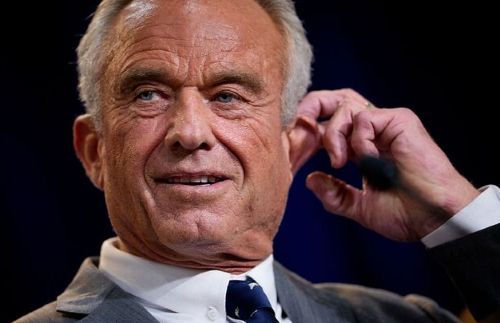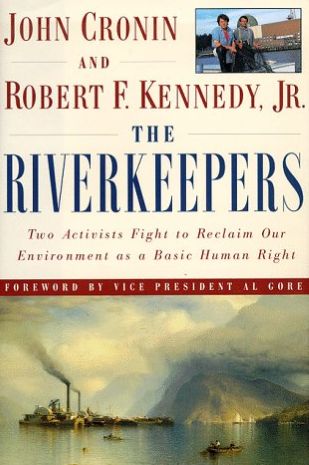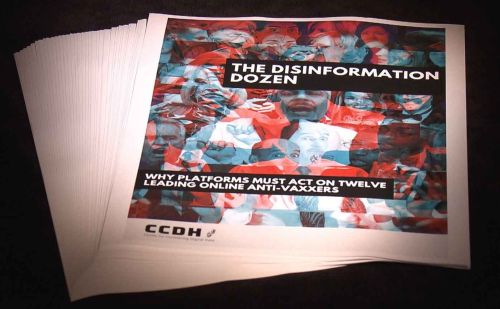

He relies on selectively interpreted data, anecdotal evidence, and a misunderstanding of basic scientific principles.

By Matthew A. McIntosh
Public Historian
Brewminate
Introduction
Robert F. Kennedy Jr., the scion of one of America’s most storied political families, has built a public profile over the past few decades that is as contentious as it is influential. Once known primarily for his environmental activism and work with organizations like Riverkeeper and the Natural Resources Defense Council, Kennedy has, in recent years, become more widely known for promoting views that critics label as “junk science”—particularly in relation to vaccines, public health, and environmental toxins.
As Kennedy campaigned for the presidency under the banner of independent populism, his history of engaging with scientifically unsupported or misleading claims came under increasing scrutiny. That continues in his current role at HHS. His narrative is a textbook example of how public figures can use their platforms to elevate fringe theories into mainstream discourse—often with real-world consequences.
From Environmentalism to Vaccine Skepticism

Robert F. Kennedy Jr. made a name for himself in the 1990s and early 2000s as a fierce advocate for environmental justice. A trained attorney, Kennedy was a key figure in environmental litigation against corporate polluters and a passionate spokesperson for clean water and renewable energy. He co-authored The Riverkeepers (1997), a well-received exposé of corporate environmental crimes and governmental regulatory failures.
But it was during this same period that Kennedy began veering into murkier scientific waters. His advocacy began shifting from evidence-backed environmental law into more controversial territory—especially regarding public health and medicine.
His 2005 article for Salon and Rolling Stone, titled “Deadly Immunity,” alleged a government cover-up of a link between vaccines containing thimerosal (a mercury-based preservative) and autism. The article was widely criticized by scientists, physicians, and journalists for misrepresenting data, selectively citing sources, and contributing to vaccine hesitancy. Eventually, Salon retracted the article altogether, citing factual inaccuracies.
Nonetheless, the damage had been done. Kennedy doubled down, founding Children’s Health Defense (CHD), an organization that has been a hub for anti-vaccine activism. CHD claims to advocate for children’s health and transparency in medicine, but it routinely publishes misleading, cherry-picked, or outright false information about vaccine safety, public health policy, and pharmaceutical science.
What Is “Junk Science”?
“Junk science” refers to the promotion of ideas or conclusions that appear to be scientific but are not supported by sound methodology, peer-reviewed research, or consensus among experts in the field. It often involves misinterpreting data, ignoring contradictory evidence, and appealing to emotion rather than reason.
Kennedy’s public statements frequently fall into this category. He has claimed, for instance, that the Centers for Disease Control and Prevention (CDC) and World Health Organization (WHO) are controlled by pharmaceutical companies, and he continues to promote the thoroughly debunked notion that vaccines are linked to autism—a claim based on a fraudulent 1998 study by Andrew Wakefield, which has since been retracted and discredited.
By invoking “Big Pharma” conspiracies and invoking the imagery of governmental malfeasance, Kennedy crafts a narrative of resistance that appeals to Americans skeptical of elite institutions. But his arguments often rely on selectively interpreted data, anecdotal evidence, and a misunderstanding of basic scientific principles.
COVID-19 and the Apex of Misinformation

The COVID-19 pandemic provided Kennedy with an unprecedented platform. As public confusion mounted, he and Children’s Health Defense spread misinformation about the virus, lockdowns, masks, and especially vaccines. CHD was labeled one of the “Disinformation Dozen” by the Center for Countering Digital Hate—twelve individuals responsible for up to 65% of anti-vaccine content on social media platforms.
Kennedy compared vaccine mandates to the Holocaust—drawing outrage and condemnation even from members of his own family. His rhetoric during this period was not only factually wrong but also dangerously inflammatory, contributing to a climate of mistrust in life-saving public health measures.
The scientific consensus is clear: vaccines have played a critical role in mitigating the spread and severity of COVID-19. Studies from institutions worldwide, including the CDC, NIH, WHO, and peer-reviewed journals like The Lancet and New England Journal of Medicine, affirm the safety and efficacy of COVID-19 vaccines. Kennedy’s claims contradict decades of immunological and epidemiological research.
Environmental Ironies and Scientific Selectivity
Kennedy’s environmental work was rooted in a deep respect for scientific findings—especially in toxicology and ecology. This makes his current rejection of mainstream scientific consensus in public health all the more puzzling. How does one reconcile trust in climate science, pollution research, and environmental impact studies with the rejection of vaccine science?
The answer may lie in a broader populist worldview. Kennedy often frames his arguments in terms of elite corruption versus grassroots truth-seeking. In this narrative, the government, corporations, and even the scientific establishment become villains; the individual who “does their own research” is the hero. This populist anti-elitism creates fertile ground for junk science, where expertise is not just questioned but actively distrusted.
The Political Implications
Kennedy’s presidential campaign is a lightning rod for alternative science narratives. Although his platform touches on a wide range of issues, his public identity remains tightly linked to his controversial views on vaccines and public health. His run as an independent candidate for the 2024 election has drawn attention from both the left and the right—particularly from voters disillusioned with the political and scientific establishment.
Some libertarians and conservatives admire his stance on bodily autonomy and skepticism of federal agencies. Meanwhile, some progressives are attracted to his environmental legacy and anti-corporate rhetoric. But across the political spectrum, many are increasingly alarmed by the normalization of disinformation through his campaign.
Kennedy has repeatedly insisted that he is not “anti-vaccine,” but rather “pro-safety.” However, this framing is itself misleading. Pro-safety advocacy would rely on rigorous scientific analysis, peer-reviewed findings, and clear communication. What Kennedy offers instead is often closer to pseudoscience wrapped in the trappings of legalistic argumentation.
Conclusion: The Cost of Credibility
Robert F. Kennedy Jr.’s evolution from respected environmental lawyer to prominent spreader of junk science reflects a broader cultural trend: the erosion of trust in institutions and expertise. His name and legacy give him a level of influence that many fringe figures never achieve, making his embrace of pseudoscience particularly dangerous.
The issue is not merely academic. Vaccine hesitancy has led to the resurgence of preventable diseases like measles. COVID-19 misinformation contributed to tens of thousands of avoidable deaths. When a public figure like Kennedy amplifies these messages, the consequences ripple through communities, especially those already vulnerable to disinformation.
In a time when science is more important than ever in addressing global crises—climate change, pandemics, food security—embracing evidence over ideology is not just a matter of intellectual rigor. It is a moral imperative.
Originally published by Brewminate, 05.16.2025, under the terms of a Creative Commons Attribution-NonCommercial-NoDerivatives 4.0 International license.


